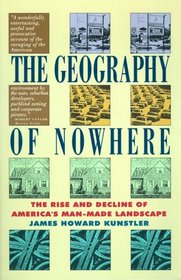Sophia C. reviewed The Geography of Nowhere: The Rise and Decline of America's Man-Made Landscape on + 289 more book reviews
Helpful Score: 2
"It makes me ashamed of my civilization," James Howard Kunstler uttered during his visit to Greenfield Village, Henry Ford's tribute to American history. Reading his The Geography of Nowhere might have you saying the same, if you agree with his critique of the built American landscape. In addition to being ugly, expensive, and unsustainably oil-dependent, Kunstler charges suburban sprawl and Modernism with destroying a true sense of place, which in turn, impoverishes our sense of home and social ties. If you agree with his analysis on the growth of the American economy, from the Pilgrims to the 1970s oil embargo, then this current economic situation seems all the more ominous. His use of "monoculture" to describe suburban developments seemed forward-thinking for this 1993 work. However, Kunstler does not really offer many solutions; perhaps they will be explored more in subsequent works (Home from Nowhere and The City in Mind). Although I found it insightful and encouraged me to think about the relationship between our physical setting and social and economic ills, I think some—those especially invested in suburbia, car culture, and extreme individualism—would not like his opinionated, somewhat condescending writing style.
Elizabeth G. reviewed The Geography of Nowhere: The Rise and Decline of America's Man-Made Landscape on
Helpful Score: 1
Very interesting study on the impact of suburbs on American culture, although a bit dated (it was written in 1993).




![header=[] body=[Get a free book credit right now by joining the club and listing 5 books you have and are willing to share with other members!] Help icon](/images/question.gif?v=90afaeb39)
